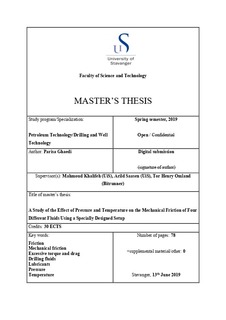| dc.description.abstract | The mechanical friction caused by the contact between the rotating drillstring and the borehole or casing can lead to significant challenges such as excessive torque and drag, limitation in running speed of drillstring and liners, pipe buckling or tubular twist-off and in severe cases complete loss of the well. Thereby, to optimize different operations with respect to such challenges, proper understanding and estimation of the mechanical friction as well as the factors which affect it, is important. In this project, a general review has been performed on the concept of mechanical friction in a wellbore. Also, the challenges caused by mechanical friction particularly during drilling and intervention operations have been discussed. In addition, different setup or instruments used by several researchers to study the effect of different parameters on the mechanical friction have been reviewed and their limitations have been pointed out.
This thesis project is essentially an experimental study which deals with investigating the effect of pressure, temperature and their combined effect on the friction coefficient of deionized water, mineral oil, oil-based and water-based mud. For this purpose, an experimental setup has been designed at the University of Stavanger which works in combination with an automated high-pressure, high-temperature consistometer from OFI Testing Equipment. Using the designed setup, several experiments were performed on the mentioned fluids at constant temperatures of 25 and 50°C, while the pressure increased from 69 bar to 345 bar at both temperatures.
In summary, it was found that, with the exclusion of the deionized water at 50°C and the oil-based mud at 25°C, pressure increase did not have a significant effect on the friction coefficient of the other fluids at the defined temperatures. Also, the change in temperature from 25 to 50°C led to a decrease in friction coefficient values of all the fluids except the deionized water. In addition, it was observed that at both temperatures, the mineral oil had the lowest values of friction coefficient compared to the other fluids while deionized water had the highest values. | nb_NO |
